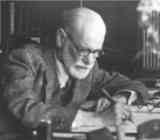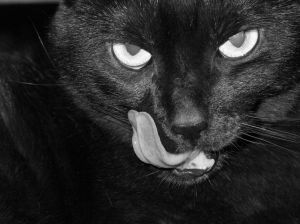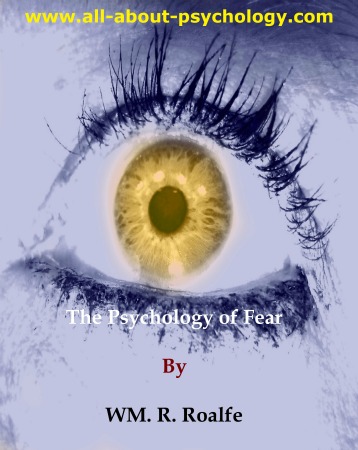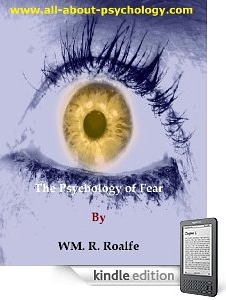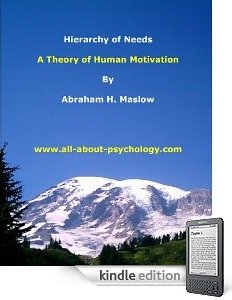|
Psychology of Fear
Psychology of Fear. Very much influenced by the dominant theoretical discourse at the time this classic article was first published in 1929. Download and Keep Your Own Copy
If you would like to download and keep a PDF text copy of this article, you can do so via the following link. This classic article is also available on Kindle.
THE ARTICLE IN FULL So far as we can see all of the sentient world is governed by what is called the pain and pleasure principle. Every living thing seeks that which gives it pleasure and avoids that which inflicts pain. This is a fundamental law which life cannot escape. It is quite obvious that in the main it serves its purpose very well and that in fact life as we know it could not otherwise exist. The operation of this law attracts to that which is necessary to its continuance and perpetuity and assists it in the avoidance of those things which would tend toward destruction of either the individual or the species. In our world, pain is just as essential as pleasure and the one could not exist without the presence of the other. Natural selection has greatly sharpened the faculty which most animals possess for the observance of this general law, and has endowed them with instinctual powers which automatically accomplish the most beneficial results, although there are some variations which seem to operate against the constructive application of the principle. However, in the long run every species must observe this fundamental law or be destroyed. The advent of man introduced many new factors into the problem of life and the evolutionary process became subject to an influence which has made many differences. This new influence or factor is self-consciousness, which has gradually developed to that stage in which we know it in ourselves. Our conscious mind, with its various attributes, exerts an influence upon our lives which makes the study of man something other and very different from the study of any other form of life. This does not mean that we cannot learn a great deal by comparisons for it is much more correct to say that man is more than animal than to say that he is totally different. The magnitude of his stature is not augmented by putting him on a pedestal as a special and isolated creation. The underlying and fundamental unity of nature is a fact which should not be despised for it is an asset which is of value just in proportion to the extent to which it is realized. Man, therefore, is not other than animal in this sense, but he is more than an animal, or perhaps it is best to say that he is his animal heritage plus those other aspects which make him the distinct species which he is. Thus in a certain sense, everything we can learn regarding animal life and especially everything we can learn regarding the animal, instinctual and rudimentary nature of man himself is of tremendous importance. Because man is this more than animal there has arisen a whole branch of study relating to him which is only faintly suggested in the study of other types of animal life. This is the study of psychology. Psychology as we generally use the term, is based upon phenomena which cannot exist except from the existence of an organism such as man presents. The mind of man has many interesting aspects, not the least of which is the duality which arises from the fact that he is both the animal and the instinctual creature and the civilized man with ideals and aspirations. A psychology based upon the denial of either of these important aspects is not psychology at all but fiction. As man has risen in the evolutionary scale and made the steep and tedious ascent which civilization represents his mind has gradually developed its outstanding characteristic which is the division into the conscious and unconscious mind. The primitive man is dominated almost entirely by the unconscious mind. His instinctual nature governs his conduct at all times and whatever conscious efforts he may make to modify it are motivated from unconscious sources so that he has very little idea as to what he is really doing. The beginnings of the development of man, as such, were for the most part unconscious just as today are the developments of the infant. Gradually self-consciousness became a reality and as time went on it began to affect the life of man in many ways until in our modern day we are definitely setting to work to study ourselves profoundly so that we may undertake our own self-direction as a conscious and purposeful endeavor. That we do this only to a very limited degree is beyond question, for we are still largely dominated by the unconscious mind. In a very general sense this division of the mind into conscious and unconscious is analogous to a similar division which we might designate as the rudimentary and unevolved mind (the unconscious) and the evolved mind (the conscious). The unconscious mind contains all those aspects which belong to our inherited and fundamental nature and which we have more or less in common with animal life in general. Of course this is not an exhaustive description of the content of the unconscious mind for it also contains all those emotions and memories which were at one time conscious but which are for the time being unconscious because the limited nature of the conscious mind is such that it cannot consider more than a very few things at any one time. Keeping in mind this fundamental distinction between the conscious and unconscious mind let us return to the consideration of the pain and pleasure principle. In the animal world the appearance or proximity of some danger, that is something that will cause or inflict pain, gives rise to that reaction which we call fear or anxiety. Students of animal life tell us that fear at once stimulates the animal menaced so that whatever means of protection he may employ are mobilized for action. With the actual arrival of the danger all fear seems to disappear and the reality of the situation is handled to the very best advantage. Regardless of the method employed for protection fear seems to be a stimulating factor. This is so in case of both flight and attack. In the animal world fear seems to be a constructive factor and arises when danger threatens but disappears when it actually arrives. Men who have been subjected to great physical dangers almost universally report an identical experience. Let the danger actually arise and the whole organism is occupied with its particular method of coping with the situation. Fear is one of the most pronounced emotions which man experiences and it has played a very important part in his development. A study of primitive races has shown that its influence is almost beyond belief. Our ancestors resorted to innumerable rites and practices which were founded upon the recognition of a power which appeared to them in the form of fear. That fear often plays an important part in childhood is now well recognized. Perhaps psychoanalysis has done more to give us an insight into this subject of fear than any other. At any rate fear is very closely related to the fundamental aspects of our psychic nature. People suffering from nervous disorders have always suffered from fear and anxiety, and consequently, Freud was very early confronted with the problem of determining their true nature. In his studies he found that invariably the fears and anxieties of his patients related to things which did not at all justify the reaction, but unlike many of his predecessors he did not dismiss these states of mind as imagination and so consider that he had disposed of the matter. What he was interested in discovering was the reason for such anxiety. Being extremely analytical he was certain that investigation would disclose the real explanations and his work and that of his successors has fully justified his original suppositions. Working on Ms fundamental hypothesis that the mind consisted of the conscious and unconscious portions he came to the conclusion that the real cause of fear and anxiety is to be found in the unconscious mind and that what the subject feels and knows is simply an outward manifestation bearing an unconscious relationship to the true source of the trouble just as the dream is a symbolic representation of unconscious processes. Years of painstaking analytic work has clearly disclosed the fact that in every case the real force or menace behind all fear and anxiety is desire. This is quite logical for desire is at the bottom of all our psychic life just as energy is the force in the natural world. Energy may manifest in countless different ways but we now recognize that it is fundamentally one. In the field of psychology this fundamental force is desire, which also manifests itself in countless different ways some of which seem paradoxical. The psychology of the unconscious mind, however, has made it possible for us to understand these seeming inconsistencies. The reason that in the field of psychology the explanation of the problem of fear is to be found in the study of desire is due to the relationship which exists between the conscious and unconscious aspects of the mind. The content of the unconscious mind is unknown to the conscious excepting in so far as it affects it when approaching the threshold of consciousness either directly or in one of the many indirect methods by which our underlying psychic life affects our conscious existence. Consequently, for each of us, when looked at from our specific conscious point of view, this content is as nonexistent or unknown as some objective fact which is not before us. If such an objective thing be a menace to our safety or comfort its approach will cause some anxiety and in extreme cases this will become a pronounced fear. In other words, our warning reaction is one of fear or anxiety. This is always the way in which danger appears to us. When we turn to the content of the unconscious mind we find that consciousness is related to it in an analogous manner and that, consequently, fear and anxiety have the same significance in regard to purely subjective dangers. Man has always vaguely understood that the most difficult and painful of all tasks was the facing of himself and psychoanalysis has fully corroborated this intuition and has emphatically shown, that we universally avoid the consideration of our own unconscious processes and that very few people indeed are willing to make an exhaustive self study. The reason for this is that we all repress those things which are unacceptable to us and thereby refuse to consider and dispose of them. Such a procedure does not solve the problems thereby presented but leaves the whole matter in abeyance. Expression is only a compromise measure and those things which we repress continue to disturb us in many indirect ways. This is a situation which exists in every mind to some extent although of course in those who are more or less normal the interference is not serious. Others who are less fortunate suffer extremely from repressed emotions and ideas and to such fear and anxiety are frequently among the most real of the problems of life. These repressed contents which consist of emotions, ideas and experiences tend to group themselves into complexes in regard to which we cannot think clearly and suitably. Every prejudice is a mild complex and if we scrutinize ourselves we can quickly discover these mild ones. The more severe complexes are usually skillfully kept from our critical attention and due to this fact they continue to affect us unconsciously. Those who do not suffer from fear and anxiety are inclined to scoff at a serious consideration of the subject and are disposed to dismiss it as of no importance. However, psychoanalysis has revealed that these are very common symptoms, the reason for which is now perfectly clear. The continual ebb and flow between the conscious and unconscious mind is bound to give rise to this manifestation to some extent in almost every highly evolved mind unless there is a condition of complete harmony between the two aspects of the mind. Under modern conditions, however, there is a serious conflict between the conscious and unconscious mind due to the tremendous strain to which man is subjected. The almost universal discontent and unrest which is such a typical symptom of our time is not an indication of disease in the pathological sense but does most emphatically indicate a want of ease or dis-ease due to the fact that the great force which desire is, is seldom properly or adequately placed. Before we proceed to show more completely the relationship between fear and desire let us devote a few moments to a brief consideration of the recent development of this driving force with which we are so inextricably involved. If we will take a glance back over the history of man we will be struck by the radical difference which exists between his present mode of life and that of earlier times. As civilization has advanced he has gradually taken on new occupations and assumed new obligations until today many of us are far removed from the simple and rudimentary problems, interests and satisfactions of life. In this steep ascent man has gained many things that are of inestimable value but it has been at the sacrifice of much that he has been loth to surrender. Particularly hard has it been for him to relinquish the goals which are dictated by his instinctual nature. Let us content ourselves with one illustration. The sexual instinct is one of the strongest which man possesses and legitimately so because it is at the very root of all life. In a natural state this instinct operates directly and preserves the species at all costs, but even among the lower animals we find that this instinct has undergone some expansion so that the perpetuation of the species may also involve the building of nests and training of the young as is the case with birds. In a similar manner most of the higher animals have developed the tendency to protect and train the young to some extent. From these simple beginnings man has evolved to his present state of culture where what corresponds to the building of the nest is nothing less than what are involved in the terms home and family and all the infinite ramifications and activities which come under this general heading. In other words, the sexual instinct which is the creative urge on the physical plane has undergone an almost unbelievable transformation during the course of our evolution so that much that seems distantly removed from this root instinct can, nevertheless be traced to it as origin. A similar procedure can be applied to all of our important instincts. This drawing off and raising of our instinctual desires and applying of them to new goals has been achieved with the greatest difficulty and there have been many failures along the line. Particularly difficult but nevertheless imperative has this been in the era immediately preceding our own as is evidenced by the spirit of puritanism which is the dramatic indication of the intense struggle which man has been waging against his less evolved unconscious impulses. We do not have to look far to discover some of the reasons for the increasing struggle. Our entire modern civilization has greatly increased the amount of instinctual desire which cannot find satisfaction along old paths. For example, economic and cultural considerations are continually deferring the time at which marriage can expediently take place. The youth of our day, as never before, must learn to bridge the increasing gap between the achievement of physical maturity and the arrival of the time when completed education and economic independence make marriage possible. This condition which has been gradually developing has now become decidedly acute. Marriage is not only being postponed but it is much more frequently a form of self-expression which is not experienced at all. These considerations, coupled with other factors, demand new forms of self-expression, which demand continues to outran our capacity to direct ourselves to new goals. This is due to the fact that man takes up new interests and activities with the greatest reluctance and against the pull of the entire past. The creative instinct can be and is frequently quite fully expressed in ways other than the biologic and its immediate ramifications and it is not at all necessary that this be the only goal for the mature individual. The force and power that is in this instinct may be directed into any activity whatsoever although if it is exceptionally strong it is usually necessary to apply it to distinctly creative work such as art. It is precisely this struggle to raise our desires and interests that presents our most crucial problem. Some achieve this transformation completely, some partially and others fail altogether. The extreme cases become neurotic with the pathological disturbances at the bottom of this tremendous struggle. There is nothing more feared by man than his own power when it is not under control which is just another way of saying that his greatest dread is the fear of his own uncontrolled appetites and desires. One of the weapons which, he has consistently applied in his battle against such desires has been repression. By this means he has refused to consciously consider those impulses which have not squared with his conscious standards and ideals. But repression is always a compromise measure and only defers the problem and removes the conflict to a new front, because desire like any other form of energy must find an outlet, and if it is not found directly it will avail itself of some indirect mode of expression, such as a nervous disorder which usually includes fear or anxiety. In this manner we can see that we not only have the key to the problem of fear and anxiety, when not arising from objective causes, but we also see why purely psychological problems, including these characteristics are so exceedingly common. It reduces itself to this very simple statement: There are an increasing number of people who have not succeeded in properly placing their instinctual and emotional forces and potentialities. In other words, they have not found an adequate outlet for the constructive expression of their desires. How true this statement is will be perfectly clear to any one who has had an opportunity to get below the surface in the study of human beings today. In a manner, the true nature of which we do not clearly understand, desire which cannot find expression as pleasure will invariably gain such expression as pain. This seems to be an inescapable rule and each one of us must experience a certain amount of emotion or feeling. Our failure to find pleasurable outlets accounts for the fact that much of our energy is converted into distress of some kind or another. Of course, in donning the proper outlets as pleasurable we do not mean pleasure in a superficial sense but pleasure in the long run. If an expression is not constructive it will inevitably bring more pain than pleasure although the pain may be deferred. Our considerations have been so brief that it hardly seems necessary to state that we have just touched upon a subject that justifies a much more extended treatment. The psychology of fear is related to some of the most important considerations which we could pursue and we must not deceive ourselves with the belief that we have exhausted the matter when we have simply had a glimpse. But before we close we should make one more observation and it this: Nothing that has been said is intended to deny that many of our fears arising from a subjective source do indicate the existence in the unconscious of something which is in itself a very real source of fear or anxiety, for the analysis of almost any person will disclose ideas and recollections which are extremely painful and which the conscious mind will dread to consider. While this is perfectly true psychoanalysis has found that none of these, not even terrifying experiences need disturb the future life of the individual and that in fact such experiences frequently leave no bad effects whatsoever. Where such experiences do cause future trouble is when they become associated with some vital instinct or emotional content in the mind. In other words, the experience itself, with the exception of some most extreme cases, can be readily overcome unless it act as a barrier to our self-expression. It is the emotion which lies back of the experience which gives the trouble. An illustration will make this fact more clear. No matter how much debris is deposited along the bank of a river there will be no retardation of the flow so long as the channel is clear but let sufficient debris accumulate and become lodged in the stream and the water will begin to back up. If this continues indefinitely the river will overflow its banks and become a menace. Shocks, unpleasant recollections and in fact any matters which we cannot or do not consciously consider and dispose of have just such effects. They dam up our emotional stream and interrupt the free expression of our desires. Every complex and prejudice does this to some extent and these are the prototypes of the more aggravated cases which may result in neurosis. Thus behind every fear and anxiety, not justified by external conditions, we find repressed desire, and many of our fears and anxieties which appear to be justified by external circumstances are, upon analysis, found to be largely or entirely attributable to subjective causes. Psychologically as well as biologically, fear is a warning of danger, to the desire to live, but psychologically it is always the sign that the urge of life within us is demanding expression. This is why psychoanalysis devotes itself to the study of those things which impede this expression. It is literally correct to say that the psychoanalyst always devotes himself to the task of removing the debris which is found in the mind of his subject. To him fear is always a potentiality which must be converted into an asset instead of a liability. Classic Articles All Psychology Students Should Read
This special Kindle collection consists of the most influential, infamous and iconic research articles ever published in the history of psychology. See following link for full details. See following link for full details. About Psychotherapy Kindle Collection Go Back To The Main Psychology Journal Articles Page Go From Psychology of Fear Back To The Home Page
|


